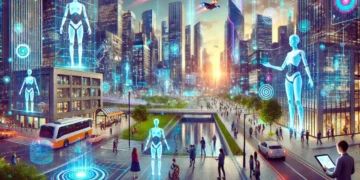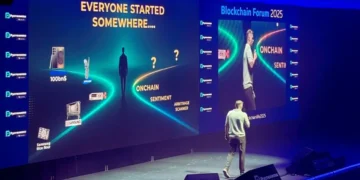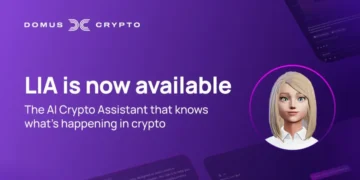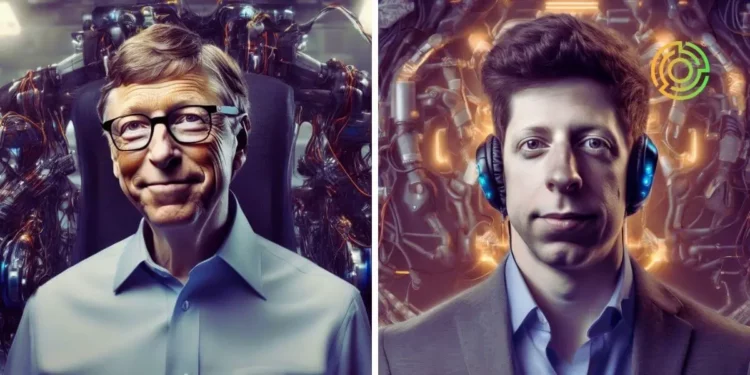In a riveting conversation between Sam Altman, the visionary behind ChatGPT, and Microsoft’s co-founder Bill Gates, the profound impact of artificial intelligence (AI) on human life took center stage. Altman, also the CEO of OpenAI, didn’t shy away from expressing the “terrifying” aspect of AI’s advancement.
A Face-to-Face Discussion on AI’s Acceleration
The dialogue unfolded in a dedicated podcast, where Altman and Gates delved into the intricacies of AI. Altman, sounding a note of caution, highlighted that humanity might struggle to keep pace with the rapid evolution of this groundbreaking technology.
During the conversation, Gates emphasized that AI would necessitate unprecedented adaptability, prompting Altman to raise alarms. “It’s not just about adapting; humanity is incredibly adaptable. However, the unprecedented speed of societal adaptation and the consequent changes in the job market are what I find potentially alarming,” Altman asserted.
The Unsettling Concerns of OpenAI’s CEO
Altman’s moral concerns and worries about the implications of his company’s work are not new. Last year, he expressed, “What concerns me the most is the hypothetical idea that we might have done something really wrong by unleashing ChatGPT.” Acknowledging that the chatbot initiated an irreversible revolution with unclear consequences, Altman admitted his apprehension about potentially overlooking something complex during ChatGPT’s development.
Bill Gates’ Surprise at ChatGPT’s Prowess
In the podcast “Unconfuse Me with Bill Gates,” the former Microsoft leader revealed his initial skepticism, stating, “I didn’t expect ChatGPT to become this good.” Gates expressed astonishment at the results, particularly highlighting the mystery of how ChatGPT chooses its responses. Altman likened this system to the human brain, where the exact workings of individual neurons remain unclear.
Gates commended Altman’s team for pushing the boundaries of AI capabilities. The conversation delved into societal adaptation to technological change and the crucial topic of AI regulation.
Advocating for AI Regulation
Altman articulated his hope for technology to advance rapidly, reaching systems with 100,000 or even a million times the computing power of GPT-4. He envisioned potential societal impacts, geopolitical power shifts, and emphasized the need for robust regulation akin to international agencies regulating nuclear weapons.
Drawing inspiration from the International Atomic Energy Agency’s (IAEA) oversight of nuclear weapons, Altman proposed a global agency to supervise powerful AI systems. This agency would conduct security audits and facilitate international cooperation to address the challenges posed by advanced AI technologies.
While Altman acknowledged that this approach won’t eliminate all risks, he believed it could significantly mitigate the most critical threats.
Insights on Social Media Regulation
Gates and Altman also touched upon the regulatory challenges surrounding social media. Altman expressed the need to scrutinize why governments have struggled to devise effective regulations in this domain.
The Inevitable Transformation by AI
Altman expressed concerns about the rapid pace at which the world must adapt to AI-driven changes. He emphasized, “Every technological revolution has been faster, and this will be, by far, the fastest.” The impending AI revolution, touted as the fastest in human history, may catch society off guard, demanding swift adaptation.
“It’s not about having to adapt; humanity is super adaptable. We’ve navigated massive technological changes, and a significant percentage of jobs can change within a couple of generations. What’s potentially a bit alarming is the speed at which society will have to adapt, and the job market will change,” Altman concluded.
See also: OpenAI Unveils GPT Store: A Game-Changer in Customized AI Conversations
Conclusion
In conclusion, the conversation between Altman and Gates offers a glimpse into the profound impact of AI on our lives. Altman’s concerns about the rapidity of societal adaptation and the potential challenges in regulating advanced AI systems underscore the need for careful consideration and global cooperation.
FAQs
What is the core message Sam Altman conveyed to Bill Gates regarding AI?
Sam Altman warned Bill Gates about the potentially “terrifying” aspects of the rapid advancement of artificial intelligence (AI). Altman emphasized the unprecedented speed at which society would need to adapt to the evolving technology.
What role does ChatGPT play in the discussion?
Sam Altman, the creator of ChatGPT and CEO of OpenAI, engaged in a podcast with Bill Gates, focusing on AI. ChatGPT’s influence on societal changes and Altman’s concerns about its impact were integral to the conversation.
How did Bill Gates react to ChatGPT’s capabilities?
Bill Gates, initially skeptical, expressed surprise at ChatGPT’s remarkable capabilities. He highlighted the mystery surrounding how ChatGPT makes its responses, drawing parallels with the complexity of the human brain.
What are Sam Altman’s concerns about ChatGPT’s implications?
Altman expressed moral concerns, stating that he worried about potentially overlooking complex aspects during ChatGPT’s development. He acknowledged that the chatbot initiated an irreversible revolution with unclear consequences.
What regulatory measures does Sam Altman advocate for in the AI field?
A5: Altman proposes robust regulation for advanced AI systems, drawing inspiration from the International Atomic Energy Agency’s oversight of nuclear weapons. He envisions a global agency conducting security audits and fostering international cooperation.
How does Sam Altman view the speed of AI’s impact on society?
Altman is concerned about the unprecedented speed of societal adaptation to AI-driven changes. He emphasized that while humanity is adaptable, the rapid pace of technological revolution, especially in the job market, is potentially alarming.
What insights were shared about the regulation of social media in the conversation?
Gates and Altman discussed the challenges governments face in regulating social media. Altman stressed the need for a thorough analysis of why effective regulations have been elusive in this domain.
How does Sam Altman propose addressing the risks associated with advanced AI?
Altman acknowledges that a regulatory approach won’t eliminate all risks but believes it can significantly mitigate the most critical threats. He proposes a global agency overseeing powerful AI systems, conducting audits, and promoting international cooperation.
What is the overarching theme of the conversation between Altman and Gates?
The conversation explores the profound impact of AI on society, highlighting Altman’s concerns about the speed of adaptation and the necessity for thoughtful regulation. It provides insights into the challenges posed by AI’s rapid evolution.
Follow us on our social networks and keep up to date with everything that happens in the Metaverse!
Twitter Linkedin Facebook Telegram Instagram Google News Amazon Store
Recent Posts
- Bitcoin Seoul 2025 to Host Global Industry Leaders for Asia’s Largest Bitcoin-Focused Conference
- What types of events move token prices the most: data-driven insights from crypto analytics
- How to Trade Bitcoin Like a Pro in 2025
- $PIXEL Staking Launches, Giving Players a Voice in Game Success and a Share in Ecosystem Rewards
- AI and Humans: The New Partnership in the Future Society











































